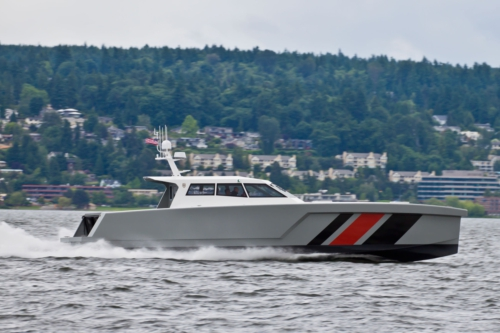
Global Maritime Security Solutions (GMSS), a security company based in Dubai, will deploy the LRV-17 vessels for security operations, including piracy protection, off the coast of Africa and surrounding areas.
The LRV-17 is modelled after the Piranha unmanned surface vessel (USV), which debuted in 2010. The Piranha was also built using nanotechnology company Zyvex Technologies' Arovex™ carbon nanotube (CNT) reinforced carbon fibre prepreg. The use of Arovex reduces structural weight, allowing for more efficient fuel usage and increased range.
Zyvex Marine, a division of Zyvex Technologies, reports that the 17 m (57 ft) LRV-17 vessel's V-hull is designed for fuel efficiency and uses an active gyroscope stabiliser for improved sea handling and decreased human fatigue factors. The boat has a sprint speed over 40 knots and a range of over 1500 nautical miles, more than three times the range of comparatively sized vessels. It is fully deployable with only two operators and can be equipped with an additional four seats for support personnel, allowing six crew to remain at sea for over five days.
Zyvex Marine performed primary design and engineering, with secondary engineering, installation and test analysis being performed by partners Pacific Coast Marine, S3 Maritime, Eltech Electric, Seakeeper, and Donald L. Blount and Associates.
"The new LRV-17 boats are game changers in maritime security missions because they are the only vessels capable of long range escort and high speeds to deal with multiple pirate threats," says Rhynhardt Berrange, Managing Director of GMSS.
"They need only small security teams to effectively operate. These attributes create a cost-effective platform to ensure maritime security. The visible presence of the new vessels is expected to deter and help prevent piracy attempts and attacks."






